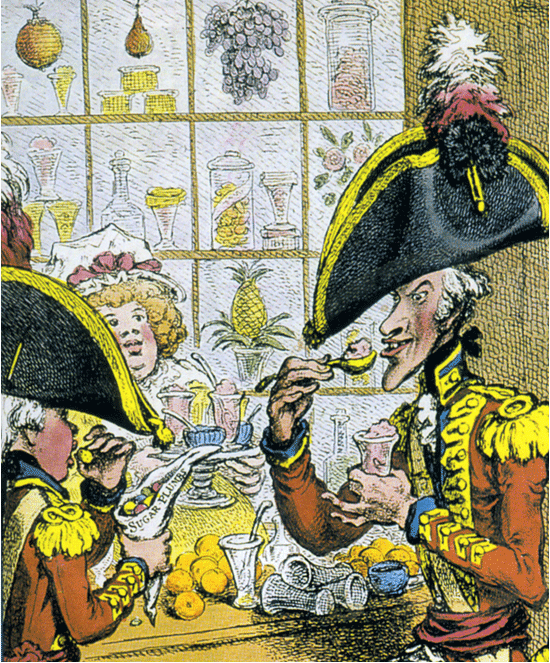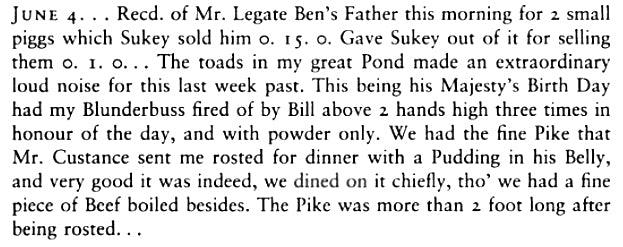Charles Wesley: Methodist Minister
 As the daughter of an Anglican minister, Jane Austen would have grown up in a family whose daily life centered around the doings and needs of the church. As music was always important to her, she no doubt took an interest in the psalms and hymns sung during each service, and would probably have been familiar with the works of Charles Wesley.
Wesley, a contemporary of Jane's father, was influential in the founding of the Methodist movement (a group Austen was aware of, considering Mary Crawford's remarks in Mansfield Park.)
As the daughter of an Anglican minister, Jane Austen would have grown up in a family whose daily life centered around the doings and needs of the church. As music was always important to her, she no doubt took an interest in the psalms and hymns sung during each service, and would probably have been familiar with the works of Charles Wesley.
Wesley, a contemporary of Jane's father, was influential in the founding of the Methodist movement (a group Austen was aware of, considering Mary Crawford's remarks in Mansfield Park.)
"A pretty good lecture, upon my word. Was it part of your last sermon? At this rate you will soon reform everybody at Mansfield and Thornton Lacey; and when I hear of you next, it may be as a celebrated preacher in some great society of Methodists, or as a missionary into foreign parts." -Mansfield ParkThe writer of over 6,000 hymns, he lays credit to two of the "Great Four Anglican Hymns", all of which were written before Jane Austen's lifetime. Wesley is, perhaps, most famous, however, for penning the now familiar Advent hymn, Come Thou Long Expected Jesus and Christmas Carol, Hark: The Herald Angels Sing (though not it it's current form, Wesley envisioned the song being sung to the same tune as his song "Christ the Lord Is Risen Today".) Charles Wesley (18 December 1707 – 29 March 1788) was the son of Susanna Wesley and Anglican clergyman Samuel Wesley. He was born in Epworth, Lincolnshire, England, where his father was rector. He was educated at Westminster School and Christ Church, Oxford. At Oxford Charles formed a prayer group among his fellow students in 1727, which his elder brother, John joined in 1729, soon becoming its leader and moulding it to his own notions. They focused on Bible study, methodical study of scripture and living a holy life. Other students mocked them, saying they were the "Holy Club", "Sacramentarians", and "the Methodists", being methodical and exceptionally detailed in their Bible study, opinions and disciplined lifestyle. George Whitefield also joined this group. After graduating with a Masters' in classical languages and literature, Charles followed his father and brother into the church in 1735. Despite their closeness, Charles and his brother John did not always agree on questions relating to their beliefs. In particular, Charles was strongly opposed to the idea of a breach with the Church of England into which they had both been ordained. On 14 October 1735, Charles and his brother John sailed on The Simmonds from Gravesend, Kent for Savannah in the Georgia Colony in British America at the request of the governor, James Oglethorpe. Charles was appointed Secretary of Indian Affairs and while John remained in Savannah, Charles went as chaplain to the garrison and colony at near-by Fort Frederica, St. Simon's Island, arriving there Tuesday, 9 March 1736 according to his journal entry.However, matters did not turn out well, and he was largely rejected by the settlers. In July 1736, Charles was commissioned to England as the bearer of dispatches to the trustees of the colony. On 16 August 1736, he sailed from Charleston, South Carolina, never to return to the Georgia colony again. Charles Wesley experienced a "conversion" on 21 May 1738 – John Wesley had a similar experience in Aldersgate Street just three days later. A City of London blue plaque at 13, Little Britain, near the church of St Botolph's-without-Alders, off St. Martin's Le Grand, marks the site of the former house of John Bray, reputed to be the scene of Wesley's evangelical conversion on 21 May 1738.

"Hark! The Herald Angels Sing" is a Christmas carol that first appeared in 1739 in the collection Hymns and Sacred Poems, having been written by Charles Wesley. A somber man, Wesley had requested and received slow and solemn music for his lyrics, not the joyful tune expected today. Moreover, Wesley's original opening couplet is "Hark! how all the welkin rings / Glory to the King of Kings". The popular version is the result of alterations by various hands, notably by Wesley's co-worker George Whitefield who changed the opening couplet to the familiar one, and by Felix Mendelssohn. A hundred years after the publication of Hymns and Sacred Poems, in 1840, Mendelssohn composed a cantata to commemorate Johann Gutenberg's invention of the printing press, and it is music from this cantata, adapted by the English musician William H. Cummings to fit the lyrics of “Hark! The Herald Angels Sing”, that propels the carol known today.Wesley felt renewed strength to spread the Gospel to ordinary people and it was around then that he began to write the poetic hymns for which he would become known. It wasn't until 1739 that the brothers took to field preaching, under the influence of George Whitefield, whose open-air preaching was already reaching great numbers of Bristol colliers. After ceasing field preaching and frequent travel due to illness, Wesley settled and worked in the area around St Marylebone Parish Church. In April 1749, he married the much younger Sarah Gwynne (1726–1822), also known as Sally. She was the daughter of Marmaduke Gwynne, a wealthy Welsh magistrate who had been converted to Methodism by Howell Harris. They moved into a house in Bristol in September 1749. Sarah accompanied the brothers on their evangelistic journeys throughout Britain, until at least 1753. After 1756 Charles made no more journeys to distant parts of the country, mainly just moving between Bristol and London.
 In 1771 Charles obtained another house, in London, and moved into it that year with his elder son. By 1778 the whole family had transferred from Bristol to the London house, at 1 Chesterfield Street, Marylebone, where they remained until Charles' death and on into the 19th century. The house in Bristol still stands and has been restored, however the London house was demolished in the mid 19th century.
Only three of the couple's children survived infancy: Charles Wesley junior (1757–1834), Sarah Wesley (1759–1828), who like her mother was also known as Sally and Samuel Wesley (1766–1837) Their other children, John, Martha Maria, Susannah, Selina and John James are all buried in Bristol having died between 1753 and 1768. Both Samuel and Charles junior were musical child prodigies and, like their father, became organists and composers. Charles junior spent most of his career as the personal organist of the English Royal family, and Samuel became one of the most accomplished musicians in the world and often called "the English Mozart." Furthermore, Samuel Wesley's son, Samuel Sebastian Wesley, was one of the foremost British composers of the 19th century.
In 1771 Charles obtained another house, in London, and moved into it that year with his elder son. By 1778 the whole family had transferred from Bristol to the London house, at 1 Chesterfield Street, Marylebone, where they remained until Charles' death and on into the 19th century. The house in Bristol still stands and has been restored, however the London house was demolished in the mid 19th century.
Only three of the couple's children survived infancy: Charles Wesley junior (1757–1834), Sarah Wesley (1759–1828), who like her mother was also known as Sally and Samuel Wesley (1766–1837) Their other children, John, Martha Maria, Susannah, Selina and John James are all buried in Bristol having died between 1753 and 1768. Both Samuel and Charles junior were musical child prodigies and, like their father, became organists and composers. Charles junior spent most of his career as the personal organist of the English Royal family, and Samuel became one of the most accomplished musicians in the world and often called "the English Mozart." Furthermore, Samuel Wesley's son, Samuel Sebastian Wesley, was one of the foremost British composers of the 19th century.
 On his deathbed Charles sent for the church's rector John Harley and told him "Sir, whatever the world may say of me, I have lived, and I die, a member of the Church of England. I pray you to bury me in your churchyard." On his death, his body was carried to the church by six clergymen of the Church of England, and a memorial stone to him stands in the gardens in Marylebone High Street, close to his burial spot. One of his sons, Samuel, became organist of the church.
Wesley's conversion had a clear impact on his doctrine, especially the doctrine of the Holy Spirit. The change in doctrine can be seen in his sermons after 1738, but is most notable in his hymns written after 1738. From his published work, "Hymns and Prayers to the Trinity" and in Hymn number 62 he writes "The Holy Ghost in part we know, For with us He resides, Our whole of good to Him we owe, Whom by His grace he guides, He doth our virtuous thoughts inspire, The evil he averts, And every seed of good desire, He planted in our hearts."
Charles communicates several doctrines; we have the personal indwelling of the Holy Spirit, the sanctifying work of the Holy Spirit, the depravity of mankind, and our personal accountability to God. This was a vital contribution not only to Methodism, but to modern theology as a whole.
On his deathbed Charles sent for the church's rector John Harley and told him "Sir, whatever the world may say of me, I have lived, and I die, a member of the Church of England. I pray you to bury me in your churchyard." On his death, his body was carried to the church by six clergymen of the Church of England, and a memorial stone to him stands in the gardens in Marylebone High Street, close to his burial spot. One of his sons, Samuel, became organist of the church.
Wesley's conversion had a clear impact on his doctrine, especially the doctrine of the Holy Spirit. The change in doctrine can be seen in his sermons after 1738, but is most notable in his hymns written after 1738. From his published work, "Hymns and Prayers to the Trinity" and in Hymn number 62 he writes "The Holy Ghost in part we know, For with us He resides, Our whole of good to Him we owe, Whom by His grace he guides, He doth our virtuous thoughts inspire, The evil he averts, And every seed of good desire, He planted in our hearts."
Charles communicates several doctrines; we have the personal indwelling of the Holy Spirit, the sanctifying work of the Holy Spirit, the depravity of mankind, and our personal accountability to God. This was a vital contribution not only to Methodism, but to modern theology as a whole.
Historical information from Wikipedia.com


